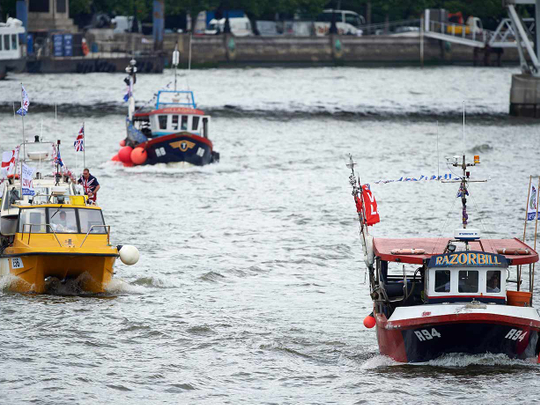
Portsmouth, UK: This is a busy seafaring city. There’s a non-stop string of cross-Channel ferries that set sail around the clock for ports in France and northern Spain.
Cars with roof racks and bicycles, minivans with surfboards, SUVs pulling caravans.
And trucks. Lots of trucks — all big rigs with Spanish, Dutch, French, Polish and other registration plates.
Up and down the English coast there are many port cities and towns like this, where the coming and going of ferries are routine. Felixstowe, Dover, Harwich, Southampton, Newcastle, Portsmouth for the Continent. Stranraer, Heysham, Holyhead, Liverpool and Pembroke Harbour for the Republic and Northern Ireland. Yes, there might be a Channel tunnel now permanently that binds the island of Britain with Europe, but fundamentally, this is an island nation.
And an island mentality.
There’s a story told that in the early part of the 20th Century, when London was enveloped in a thick pea soup fog, the Times newspaper ran a headline: Fog in Channel, Continent cut off.
Yes, London back then was the centre of the empire, and everything and everywhere else revolved around it.
This island mentality partially explains why membership of the European Union has never sat easily with Britons.
The whole reason for the coming together of the European nations in the early 1970s was a political project in trying to ensure that never again would Europe be ripped apart by war, as had happened three times in the previous century then: Prussian cavalry had ridden all the way to Paris; the forces of the Kaiser had nearly done the same, and the storm troopers of Hitler had devastated Europe from the Pyrenees to Moscow.
And the generation of post-Second World War politicians charged with rebuilding Europe were determined never for that killing and carnage to happen again.
While Europe was ripped apart, Britain stood largely alone, fighting, independent and proud. Perfidious Albion, a powerful island nation.
And when Europe came together, first as a common market with West Germany, Luxembourg and France, Holland, Belgium and Italy, it was the French who opposed Britain’s entry time and time again. Charles de Gaulle, the leader of the Free-French forces and who later became President of France, would have you believe the Brits simply weren’t European: the reality was far more political — with London in the fold, it would be far more difficult to control the nature and future of the growing club.
But the Brits got in under Sir Edward Heath, then the Prime Minister, in 1973. Two years later, Britons backed decision to join the common market by a two-thirds majority.
This port of Portsmouth is also the home base of the Royal Navy, and a good portion of the harbour is dominated by the grey ships and service tenders that make up the fleet. It was this Royal Navy that allowed Britannia to rule and waves and waive the rules around its global empire.
Whatever the events on the Continent, or elsewhere, the ships could be dispatched from the powerful island nation.
The last time that happened in earnest, in 1982, Prime Minister Margaret Thatcher assembled whatever armada of frigates were available, then commandeered container ships, cargo vessels and cruise liners — and dispatched them all to dispatch the Argentinians from the Falklands.
Yes, once again, Britain was an island nation, even if the power had to be a mismatched flotilla cobbled together.
At the ferry terminals where the cars and trucks come and go, there’s little paperwork and few formalities. Travelling across to Europe is pretty seamless.
Come Friday morning, when the votes are counted and regardless of whether it’s Remain or Leave, Britain will still be an island nation. Powerful or powerless against the tide of globalisation?












